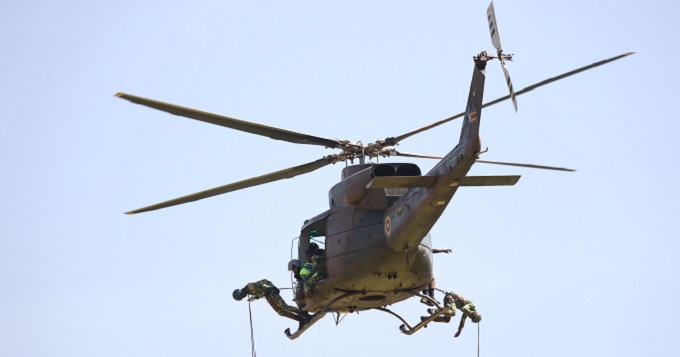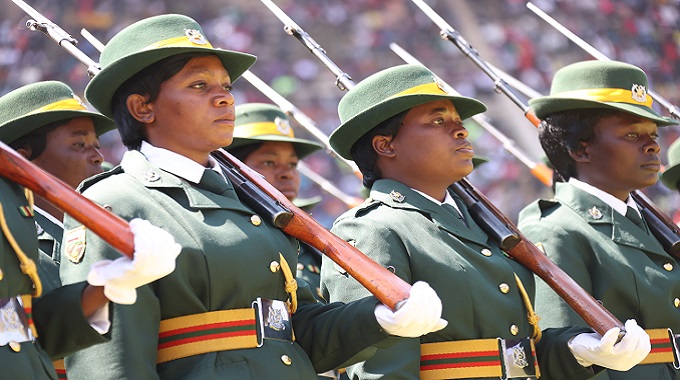
The Sunday Mail

LAST week, Zimbabwe commemorated the 43rd Defence Forces Day, marking a milestone in the history of the country’s armed forces, which have been responsible for maintaining the country’s peace and security. Emmanuel Kafe and Theseus Shambare of The Sunday Mail (SM) interviewed Zimbabwe Defence Forces director-general (policy, public relations and international affairs) Brigadier-General AUGUSTINE CHIPWERE (AC) on the importance of the commemorations and a range of other issues.
****************
SM: Zimbabwe celebrated Defence Forces Day on Tuesday. Can you outline the significance of this day and importance of celebrating a country’s defence forces?
AC: The Zimbabwe Defence Forces Day is a day when we celebrate the birth of the force and its subsequent milestones over the years.

Members of the Defence Forces thrill thousands of people with drills. — Pictures: Believe Nyakudjara
The historic formation of the Zimbabwe Defence Forces (ZDF) from the amalgamation of ZIPRA and ZANLA, with their then adversary, the Rhodesian Army, was one of the major success stories of our independence.
The history of the ZDF is pregnant with numerous successes in the promotion and preservation of peace and security in the country, region and beyond.
As part of the country’s contribution to international peace and security, the ZDF continues to deploy its personnel in peace support operations under the auspices of the United Nations and the African Union.
Notable milestones in the history of the ZDF include the continuous development and improvement of training and education within ZDF institutions.

Members of the Defence Forces perform mass displays before thousands of people who converged on the National Sports Stadium for the Defence Forces Day commemorations in Harare
The establishment of the Zimbabwe National Defence University has provided the ZDF with the capacity to effectively participate in the heritage-based Education 5.0 model, which has facilitated the pursuit of research and innovation in the ZDF.
SM: The Second Republic has espoused the gospel of economic development through home-grown solutions. What role has the ZDF played in fostering economic development?
AC: The ZDF has a constitutional mandate of maintaining peace and stability, as well as safeguarding the country’s national independence, sovereignty and territorial integrity and national interests.
This is based on the realisation that no meaningful and sustainable development can take place without peace and stability.
SM: Can you outline some of the projects that have been undertaken by the ZDF that have gone towards facilitating economic development over the last five years.
AC: The ZDF has and continues to contribute towards socio-economic development programmes through its secondary role of military assistance to civil ministries and authorities.
In fulfilment of its obligations, in line with the secondary role, the ZDF thrust has been on a drive to enhance human security as a basis for meaningful economic development.
The ZDF has, to a great extent, been involved in the construction of schools, clinics and other social infrastructure aimed at improving livelihoods of the population, which is a key ingredient for economic development.
SM: Some countries such as Russia are known to have first-rate military industries and here in Zimbabwe, we have the Zimbabwe Defence Industries (ZDI), which has been under sanctions for close to two decades. Can you outline what you are doing to ensure the ZDI returns to its previous state before it was put under sanctions?
AC: The Zimbabwe Defence Industries’ growth over the past decades has been inhibited by the illegal sanctions imposed on Zimbabwe.
Despite the constraints caused by the illegal sanctions, to keep pace with modern manufacturing innovations, efforts towards recapacitation of the Zimbabwe Defence Industries are work in progress.
SM: Last year, the Air Force of Zimbabwe unveiled the long-mothballed squadron of Hawk Fighter jets, which had been grounded for years. Tell us how you managed such a feat given the fact that we are under sanctions?
AC: The ZDF continues to seek ways to maintain its assets in a functional state through various innovations.
SM: President Mnangagwa has emphasised the need for peace and unity as the bedrock for development. What role do you think the Zimbabwe Defence Forces can play to foster unity and peace?
AC: For starters, the genetic makeup of the ZDF indicates that it is a people’s force.
The ZDF recruitment policy is non-discriminatory.
From its establishment, the ZDF has always pursued a policy of recruiting its members equitably from across all the administrative provinces of the country.
This all-encompassing recruitment policy has ensured that the ZDF human resource reflects the population make-up of our country.
SM: The ZDF is renowned for its humanitarian work that has helped transform marginalised communities since independence. You also played a key role in rescue and recovery efforts following Cyclone Idai. Were you prepared for such a disaster?
AC: In 2019, the country experienced a very unusual weather phenomenon — Cyclone Idai.
The ZDF is part of the country’s civil protection architecture and is represented at the national, provincial and district levels.
Within the civil protection architecture, the ZDF’s primary responsibility at all levels is to carry out search and rescue operations, as well as provision of emergency medical cover and transportation to where these will be needed, and also the provision of security.
Depending on the magnitude and severity of the disaster, the ZDF may be required to take the lead in the initial stages of the mitigation efforts and also carry out additional tasks.
The extent of destruction by Cyclone Idai was severe as it caused extensive damage to communication and other key infrastructure.
No communication was possible, with the electricity grid destroyed, together with roads and bridges.
In view of the hazardous conditions generated by Cyclone Idai, the ZDF took the lead to move into the affected areas to assess the extent of loss of human life, infrastructure damage and livelihood disruptions.
From the initial assessment, it was established that the desperate situation demanded military intervention beyond the search and rescue responsibility.
It also had to include intervention in specialised areas such as communication, the medical aspect, road construction, exhumation of bodies and burials.
Logistics support in the form of food and shelter was also urgently required to bring stability to the situation.
As we move into the future, the ZDF stands ready to deal with more weather-related catastrophes such the one caused by Cyclone Idai and possibly even worse.
The lessons learnt from Cyclone Idai and other past natural disasters have assisted towards enhancing the ZDF’s preparedness to deal with disasters of a similar nature in future.
SM: Tell us about the community projects you are presently involved in.
AC: The ZDF is committed to assisting marginalised communities as part of its corporate social responsibility activities.
This function is undertaken as one of ZDF’s secondary roles of military assistance to civil ministries and authorities.
Community assistance is provided to needy communities through continuous defence community assistance projects across the country. The programme provides assistance in the form of construction of public utilities such as clinics, schools and bridges.
The ZDF’s contribution in community assistance projects encompasses provision of skilled manpower while the respective beneficiaries supply building materials and labour. The infrastructure the ZDF has assisted in constructing nationwide is aimed at improving livelihoods of the ordinary citizen and act as building blocks towards the attainment of Vision 2030.
In line with the devolution concept, the ZDF has restructured its approach to ensure the projects conform to the overall provincial development plans.
This will enable the ZDF to have a wider reach on the needy communities and also make a positive contribution towards Vision 2030.
This year, during the community assistance week, ZDF carried out free medical outreach programmes at the following centres: Gurungweni Secondary School in Chikombedzi, Idube Clinic in Hwedza and another clinic in Mahusekwa (Marondera).
SM: Can you outline progress you have made in terms of demining activities since the onset of the Second Republic?
AC: The existence of landmines and remnants of war along our borders continues to pose a direct threat to human and animal life, while also posing an economic threat to the people by denying them access to land for agricultural and other commercial uses.
Zimbabwe continues to ensure she meets her obligations to the Anti-Personnel Mine Ban Convention and has made significant strides towards achieving a mine-free Zimbabwe by 2025.
The ZDF is undertaking demining operations in all the affected areas along our borders with Mozambique.
At independence in 1980, the mine hazardous area throughout the country was over 310 65 square kilometres.
By the end of December 2022, only 17,2km2 of the mined area remained.
The remaining mined area is being cleared by the ZNA’s National Mine Clearance Unit and four international non-governmental organisations — the Hazardous Area Life Support Organisation, the Mine Advisory Group, the Norwegian People’s Aid and the Anti-Personnel Landmine Detection Product Development.
SM: The ZDF is known for undertaking collaborative work with other regional defence forces to enhance its operational capabilities. Can you outline some of the collaborative work you have been doing over the last few years?
AC: The Zimbabwe Defence Policy reiterates the commitment of the Republic of Zimbabwe to being part of the common regional security architecture for the maintenance of regional and international peace.
To this end, the ZDF is part of the collective security architecture within the framework of the Africa Standby Force, under the auspices of the African Union; and in the Southern African Development Community (SADC), within the framework of the SADC Standby Force.
In the same vein, the ZDF continues to collaborate with sister defence forces in the region through the enrolment of their officers at its training institutions, including the Zimbabwe National Defence University and the Zimbabwe Staff College.
SM: We now turn to issues of the welfare of our service women and men. Can you outline some of the initiatives the ZDF is making to improve their welfare?
AC: The Zimbabwe National Army and the Air Force of Zimbabwe have welfare funds specifically for the in-service welfare needs of members.
Additionally, the Zimbabwe Defence Forces Benefit Fund takes care of members’ post-retirement accommodation needs.
Through the benefit fund, members of the ZDF are being assisted to acquire residential stands and access loans for constructing their own houses.
The acquisition of residential stands has been extended to rural district councils and this has helped towards the acquisition of more residential stands.
SM: President Mnangagwa has made empowerment of women one of his signature policies. What is the ZDF doing to empower women within its ranks?
AC: The ZDF has a clear gender policy that promotes equality.
This starts at the entry point on recruitment, with equal opportunities being given to both males and females.
There are no restrictions based on gender or what a soldier can or cannot do.
It goes down to one’s mentality and creation of boundaries or limitations by individuals.
This can be confirmed by the representation of both males and females in all the different trades or corps in the ZDF, as well as the distribution across the rank structures.
SM: As we approach the 2023 harmonised elections, there are some stakeholders who are known to foment violence through support from some Western countries. What message do you have for such characters?
AC: We call for peace before, during and after elections.
Zimbabweans should not be used by foreigners whose only interest is to perpetuate strife, disharmony and underdevelopment in the country.
We want to remind all Zimbabweans that there is Zimbabwe beyond the elections.



